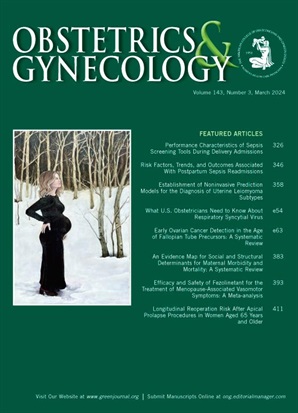Pregnancy in Patients With Cystic Fibrosis.
IF 4.7
2区 医学
Q1 OBSTETRICS & GYNECOLOGY
引用次数: 0
Abstract
Cystic fibrosis (CF) is an autosomal recessive, monogenic disorder that affects individuals of all races and ethnicities. It was historically viewed as a pediatric disease, but with comprehensive care and therapeutic advances, adults with CF now outnumber children living with CF in the United States, and the median predicted life expectancy is approximately 61 years. Since 2010, a new drug class called CF transmembrane conductance regulator (CFTR) modulators has emerged and led to improved health outcomes for most people with CF in the United States. These new medications have likely contributed to a doubling of pregnancies among women with CF in recent years. In the setting of increased fertility, people with CF should consider contraception when pregnancy is not desired. For people with CF who are seeking pregnancy, preconception consultation with expertise in maternal-fetal medicine and genetics and a dedicated CF team is important because of the increased morbidity among pregnant people with CF. Breastfeeding is possible and encouraged when taking CFTR modulators, although the pediatrician should monitor the infant for possible side effects given established transfer through breast milk. Single-gene noninvasive prenatal testing is emerging and offers a new strategy to screen for fetal CF, which is increasingly important with emerging evidence that transplacental transfer of CFTR modulators may delay, prevent, or reverse multiple CF manifestations for the fetus with CF. Research is ongoing to study pregnancy and parenthood in the modern era in people with CF.囊性纤维化患者的妊娠
囊性纤维化(CF)是一种常染色体隐性单基因疾病,影响所有种族和民族的个体。在历史上,它被视为一种儿科疾病,但随着全面的护理和治疗的进步,在美国,患有CF的成年人现在超过了患有CF的儿童,平均预期寿命约为61岁。自2010年以来,一种名为CF跨膜传导调节剂(CFTR)调节剂的新药类别出现,并改善了美国大多数CF患者的健康状况。近年来,这些新药物可能导致CF患者的怀孕率增加了一倍。在生育能力提高的情况下,CF患者在不希望怀孕时应考虑避孕。对于正在寻求怀孕的CF患者,孕前咨询母胎医学和遗传学专家以及CF专业团队是很重要的,因为CF孕妇的发病率在增加。在服用CFTR调制剂时,母乳喂养是可能的,并且鼓励母乳喂养,尽管儿科医生应该监测婴儿是否有可能通过母乳转移的副作用。单基因无创产前检测正在出现,并为筛查胎儿CF提供了一种新的策略,随着越来越多的证据表明经胎盘转移CFTR调节剂可能延迟、预防或逆转CF胎儿的多种CF表现,这一点变得越来越重要。研究正在进行中,以研究现代CF患者的妊娠和亲子关系。
本文章由计算机程序翻译,如有差异,请以英文原文为准。
求助全文
约1分钟内获得全文
求助全文
来源期刊

Obstetrics and gynecology
医学-妇产科学
CiteScore
11.10
自引率
4.20%
发文量
867
审稿时长
1 months
期刊介绍:
"Obstetrics & Gynecology," affectionately known as "The Green Journal," is the official publication of the American College of Obstetricians and Gynecologists (ACOG). Since its inception in 1953, the journal has been dedicated to advancing the clinical practice of obstetrics and gynecology, as well as related fields. The journal's mission is to promote excellence in these areas by publishing a diverse range of articles that cover translational and clinical topics.
"Obstetrics & Gynecology" provides a platform for the dissemination of evidence-based research, clinical guidelines, and expert opinions that are essential for the continuous improvement of women's health care. The journal's content is designed to inform and educate obstetricians, gynecologists, and other healthcare professionals, ensuring that they stay abreast of the latest developments and best practices in their field.
 求助内容:
求助内容: 应助结果提醒方式:
应助结果提醒方式:


